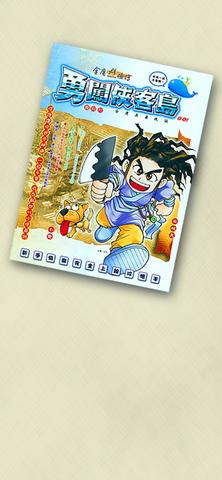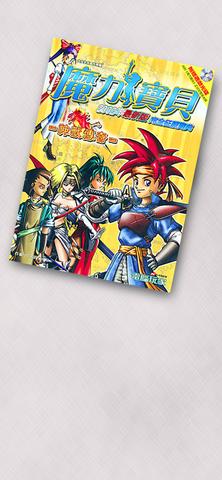Role-playing games have been around a long time, but since they migrated from dice and paper to the computer and then to the Internet, there influence has become incredibly pervasive. The game Lineage (天堂), which currently hold the No. 1 slot, boasts over 2 million subscribers, and its popularity is even having a social impact outside the virtual world.
Lineage, which has been around for two years is far from being the most advanced game available in Internet cafes, but such is its popularity that it has created its own economic structure that has blurred the line between the virtual world and the real world, and established a self-sustaining momentum in which the reason it continues to draw new players is because of its popularity.

According to the Institute for Information Industry estimates, for the first half of the year to July, production value of online games has already increased by 50 percent over the same time last year, and the value continues to grow. The majority of players are middle and high school students, but the age range is gradually extending downwards to primary school children.

"The three most popular online games at the present time are Lineage, followed by JY Online (金庸群俠傳) by Soft-World (智冠科技) and the third is Cross Gate (魔力寶貝) by Soft-Star (大宇科技). All these games follow the basic role-playing game (RPG) format, in which players pick a character of a certain race or profession, and then go out to battle computer-generated monsters or each other in a quest for experience points, skills equipment and weapons," said Michael Fu (傅鏡暉), who monitors the Internet game market.
Fu, formerly the director of Joypark Website's creative department, was the moving force behind the release of Cross Gate, which was designed in Japan, for the Taiwan market. Fu emphasized that Taiwan continues to follow trends from Korean and Japan (the exception being JY Online), but the field of players is much more difficult to manage, with a surfeit of hackers and would-be-cheats creating many problems for game masters, the human element managing the virtual worlds that are the center of RPG.

"Local players will piggy-back "mods," external applications which allow them to rise in skill level more rapidly or give them invincibility, or even, by altering the program, steal the treasure that have been accumulated by others through arduous adventuring. This kind of thing is much more prevalent in Taiwan than in either Korean or Japan," Fu said. "Take Lineage for example. It has been on the market for two years. Its graphics are no longer very spectacular, but because its player base is simply so large, kids can spend all day in the virtual world making friends. Even some Internet cafe owners go online, playing the lord of a town and interact with customers that way. It has become a separate economic structure, with online players exchanging real money for virtual treasures or other advantages in the game", said John Chiang (蔣鏡明) chief editor of Net Game Biweekly (網路遊戲雙週刊總編輯).
Chiang said that some social critics worry that games like Lineage, which have developed such an "independent economic structure" could serve as a channel for the sale of drugs or sex. "This is the kind of thing that people say who don't understand the game world," he said.
"This is not what we worry about. What we do worry about is that lack of game management resources [for the game world] that may lead to the twisting of a child's values, and that he will bring what he learns in the game out into the real world." He pointed to instances in which "brotherhoods" a grouping permitted under Lineage where players gang together to attack or steal from other plays, has overflowed into the real world, which gangs of players actually threatening or beating up other players "As most of the players are students, they don't necessarily have the self-discipline, so that it is up to the game managers to outline acceptable behavior," Chiang said.
With the release of Cross Gate, Chiang said that the social rules of the modern world have been incorporated to a much greater degree. For example, if someone wants to buy a sword, he still has to stand in line at the shop and follow the accepted procedure, otherwise he is likely to be criticized by other players. "It doesn't encourage killing to the same degree," Chiang said. "Interaction is much more important.
And as for fighting, players of different levels cannot just start fighting anyhow, but must go through a duel, so there is a good deal more interaction. We fear that players of Lineage are losing control."
Lai Chun-kuang, a senior columnist for PC Gamer magazine of the game environment, said that he feared the influence of Lineage is so great that in the next two years, it is unlikely that any game will be able to take its place. He added that Korean and Japanese games are likely to continue dominating the market, with Taiwan's games at least five years behind the pace. "JY Online, which draws on Louis Cha's (金庸) famous series of Chinese martial arts novels, has been able to hold its own only because of the appeal of its subject matter in China, Taiwan and Hong Kong," Lai said. "Only because of this, can it hold secnd place. Most other locally dev eloped games lag far behind that produced in Japan and Korea."

On April 26, The Lancet published a letter from two doctors at Taichung-based China Medical University Hospital (CMUH) warning that “Taiwan’s Health Care System is on the Brink of Collapse.” The authors said that “Years of policy inaction and mismanagement of resources have led to the National Health Insurance system operating under unsustainable conditions.” The pushback was immediate. Errors in the paper were quickly identified and publicized, to discredit the authors (the hospital apologized). CNA reported that CMUH said the letter described Taiwan in 2021 as having 62 nurses per 10,000 people, when the correct number was 78 nurses per 10,000

As we live longer, our risk of cognitive impairment is increasing. How can we delay the onset of symptoms? Do we have to give up every indulgence or can small changes make a difference? We asked neurologists for tips on how to keep our brains healthy for life. TAKE CARE OF YOUR HEALTH “All of the sensible things that apply to bodily health apply to brain health,” says Suzanne O’Sullivan, a consultant in neurology at the National Hospital for Neurology and Neurosurgery in London, and the author of The Age of Diagnosis. “When you’re 20, you can get away with absolute

May 5 to May 11 What started out as friction between Taiwanese students at Taichung First High School and a Japanese head cook escalated dramatically over the first two weeks of May 1927. It began on April 30 when the cook’s wife knew that lotus starch used in that night’s dinner had rat feces in it, but failed to inform staff until the meal was already prepared. The students believed that her silence was intentional, and filed a complaint. The school’s Japanese administrators sided with the cook’s family, dismissing the students as troublemakers and clamping down on their freedoms — with

As Donald Trump’s executive order in March led to the shuttering of Voice of America (VOA) — the global broadcaster whose roots date back to the fight against Nazi propaganda — he quickly attracted support from figures not used to aligning themselves with any US administration. Trump had ordered the US Agency for Global Media, the federal agency that funds VOA and other groups promoting independent journalism overseas, to be “eliminated to the maximum extent consistent with applicable law.” The decision suddenly halted programming in 49 languages to more than 425 million people. In Moscow, Margarita Simonyan, the hardline editor-in-chief of the